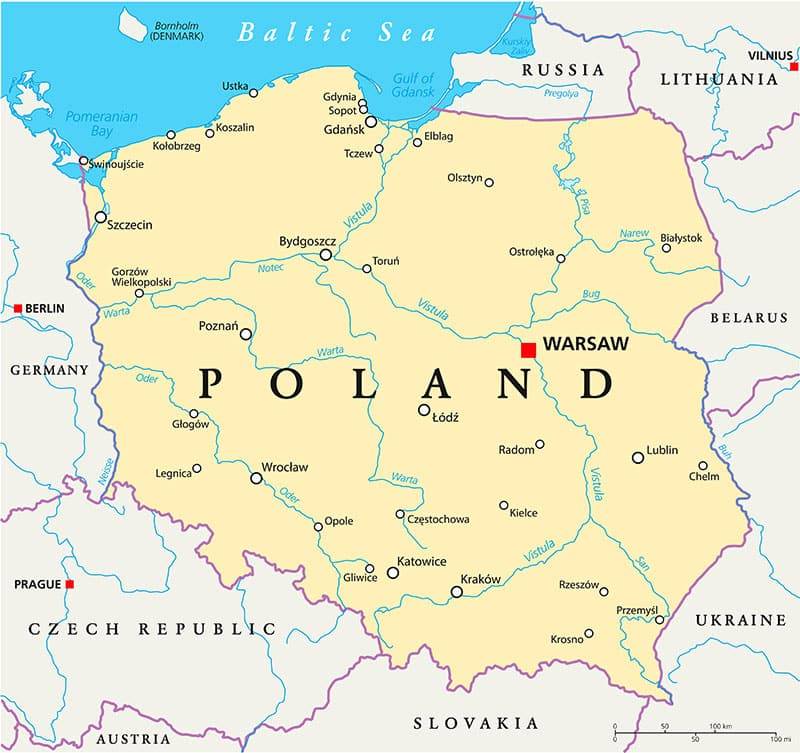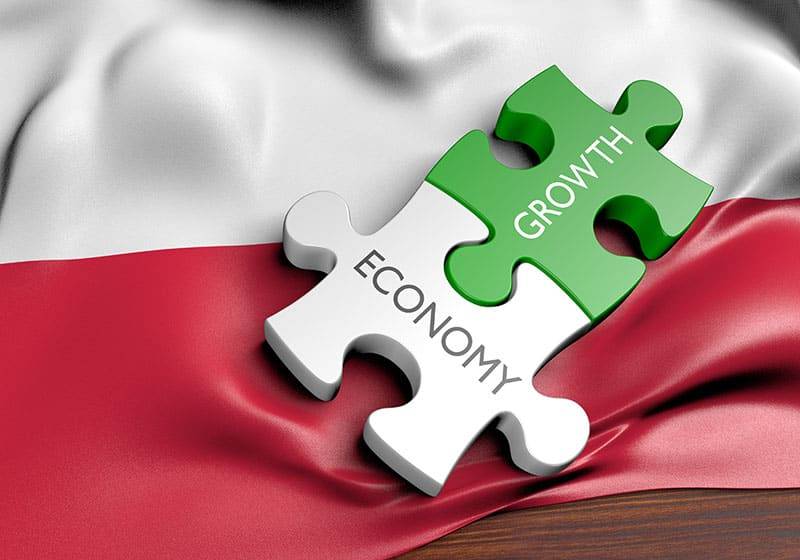Poland, nestled in the heart of Europe, provides a fertile landscape for a wide range of service-oriented initiatives, from information technology (IT) to business process outsourcing (BPO), attracting a global span of investors and entrepreneurs. The essence of this economic scenario isn’t just its growth route but also the opportunities it may provide for ultra-high-net-worth individuals (UHNWIs) and high-net-worth individuals (HNWIs) looking to broaden and enhance their investment portfolios.
This article highlights how Poland’s service industry connects with the global investment community, highlighting its financial stability and promise as a hub for business services outsourcing, IT innovation, and a variety of other service industries. The combination of a competent workforce, a strategic geographic location, and a favourable regulatory environment has likely put Poland on the minds of investors, particularly UHNWIs and HNWIs who are continually on the lookout for profitable yet stable investment landscapes.

Employment Expansion in the Service Sector
Poland’s booming service sector offers plenty of job opportunities, greatly contributing to the country’s economic fabric. Information technology (IT) and administrative and support services are the two key sub-sectors driving this job growth. Their growth narratives not only define the employment landscape but also point to potential investment opportunities, particularly for UHNWIs and HNWIs.
Surge in Information Technology (IT) Employment
The IT sector in Poland has grown dramatically, becoming a critical component of the service sector’s employment machine. According to an ABSL (Association of Business Service Leaders in Poland) research, job prospects in the IT sector have steadily increased over the years. The growing demand for tech-savvy professionals demonstrates the sector’s expansion.
Major global IT giants have discovered a favourable ecosystem in Poland to build operating bases. Companies such as Google, Microsoft, and Cisco have a strong presence, and their investment in the Polish IT setting is a strong confirmation of the country’s potential. These enterprises, among others, are not only creating jobs but also contributing to the sector’s technological growth, transforming Poland into a major IT hub in the region.
Employment growth in this industry translates to economic stability. As more people find work, there is an increase in financial freedom, which supports consumer purchasing. This expenditure circulates throughout the economy, promoting a healthy cycle of economic activity and stability. The long-lasting impact of employment creation in this industry continues beyond the immediate economic advantages, potentially providing a stable climate for UHNWI and HNWI investments.
Blossoming BPO and SSC Sectors
The expanding business process outsourcing (BPO) and shared service centres (SSC) industries add to Poland’s service industry trend. These industries reflect Poland’s changing economic landscape and offer a wide range of opportunities for UHNWIs and HNWIs interested in investing in emerging economies.
Regional Spotlight: Łódź as a BPO Stronghold
Łódź has established itself as a centre for BPO activities. The city’s favourable economic environment, combined with a trained workforce, makes it an ideal location for multinational corporations seeking to outsource corporate functions. The positive implications of such BPO activities can be seen in the region’s employment figures and economic stability. The global BPO market is expected to reach $435.89 billion by 2028, according to Grand View Research.
Shared Service Centres (SSC) Flourishing
The rise of SSCs in Poland reflects the country’s progressive economic landscape. SSCs have grown to be an important component of the service sector, providing multinational corporations with a variety of services such as finance, human resources, and information technology. The expansion of SSCs not only creates jobs but also adds sophistication to the service sector, making Poland a desirable destination for shared services.
A number of multinational firms have created SSCs in Poland, propelling the sector ahead. Companies such as Accenture, Capgemini, and Infosys have established shared service centres, contributing to the sector’s expansion and Poland’s growing image as a shared services hub. Their investment in SSCs highlights Poland’s ability to provide powerful shared service solutions to the global market.
Attracting Foreign Direct Investment (FDI)
Foreign direct investment (FDI) has notably enhanced the story of Poland’s economic rise, particularly in the business services sector. This flood not only reflects Poland’s appealing investment landscape but also points to a potential future for UHNWIs and HNWIs eager to invest in rising European economies.
FDI in the Business Services Sector
The FDI flow into Poland’s business services sector has shown growth in recent years. This upward trend reflects the sector’s attractiveness to foreign investors, who are drawn to the country’s competent workforce, strategic geographic location, and favourable business environment. The continuous incorporation of FDI is critical in raising the sector to new heights.
Foreign investors’ testimonials highlight the compelling aspects that make Poland an appealing investment destination. Investors frequently cite the combination of low cost labour, cheap operational expenses, and a pro-business regulatory framework as important considerations in their decision to invest in Poland.
Other Service Industries Making Waves
Other service industries in Poland are gaining pace and contributing to the economy’s strength beyond the well-marked roads of IT and commercial outsourcing. The financial services, tourism, and transportation sectors stand out, each with their own set of difficulties and opportunities that may spark the interest of UHNWIs and HNWIs.

Financial Services
The coexistence of banks and fintech firms in Poland represents a financial ecosystem that values both tradition and innovation. While banks remain the foundation of the financial system, fintech firms are bringing in a new wave of innovation, opening up new channels for financial transactions and services.
Poland’s regulatory framework has been favourable to the expansion of the financial services sector. Clarity in regulatory frameworks offers investors and companies operating in this field a sense of certainty. However, it is critical to stay on top of any regulatory developments that may affect the business.
Tourism and Transport
The pandemic had a significant impact on the tourism industry, which is now recovering. The progressive reopening of borders and the relaxation of travel restrictions are indicators of revival. Similarly, the transport sector is gaining popularity, and it is playing an important role in restoring the tourism economy.
In Poland, transport infrastructure is the lifeline for service delivery. The wide network of highways, railways, and airports promotes the transportation of goods and people, which is critical for the survival and expansion of the service industry. The ongoing investment in transportation systems shows Poland’s significance in improving connectivity and service delivery.
Although separate, the growth narratives of Poland’s financial services, tourism, and transportation sectors are linked with the broader economic fabric. The changing trends in these industries may offer a broad range of investment options for UHNWIs and HNWIs, each with its own set of risks and benefits.
Regional Development and Economic Prosperity
The trend of regional development in Poland reveals how focused efforts at the local level may continue to generate national economic growth. The mutually beneficial connection between regional prosperity and national economic well-being is critical, particularly for UHNWIs and HNWIs seeking to understand economic dynamics prior to making investment decisions.
The Road to Sustainable Growth
The Polish government has been active in carrying out efforts to promote regional development. Infrastructure investment, improving local entrepreneurship, and promoting innovation are some of the initiatives undertaken to drive regional growth. The government’s approach is comprehensive, ensuring that the benefits of growth seep down to the regional level, creating a favourable environment for both domestic and foreign investment.
The Domino Effect: Regional Growth Fosters National Prosperity
Regional growth has a visible impact on the national economy. As regions flourish, they make major contributions to the national economy. Increased regional economic activity not only generates jobs but also improves the nation’s overall economic health. This, in turn, provides a favourable investment environment, potentially opening up a multitude of options for UHNWIs and HNWIs. Regional development’s lasting impact is critical to creating larger economic growth.
Poland’s economy is a rich mix of varied sectors, pushing its growth track. Poland represents an exciting economic narrative, from the active IT and BPO sectors to the steady expansion of financial services and the durability shown by the tourism and transport sectors. The coordinated government actions promoting regional development highlight the country’s commitment to establishing a favourable environment for long-term growth and investment. The Polish market may provide a canvas of investment options for UHNWIs and HNWIs against a backdrop of economic stability and prosperity. Investors can navigate the multitude of opportunities available in Poland’s economic landscape by getting into the details of each sector and understanding the broader economic structure.








